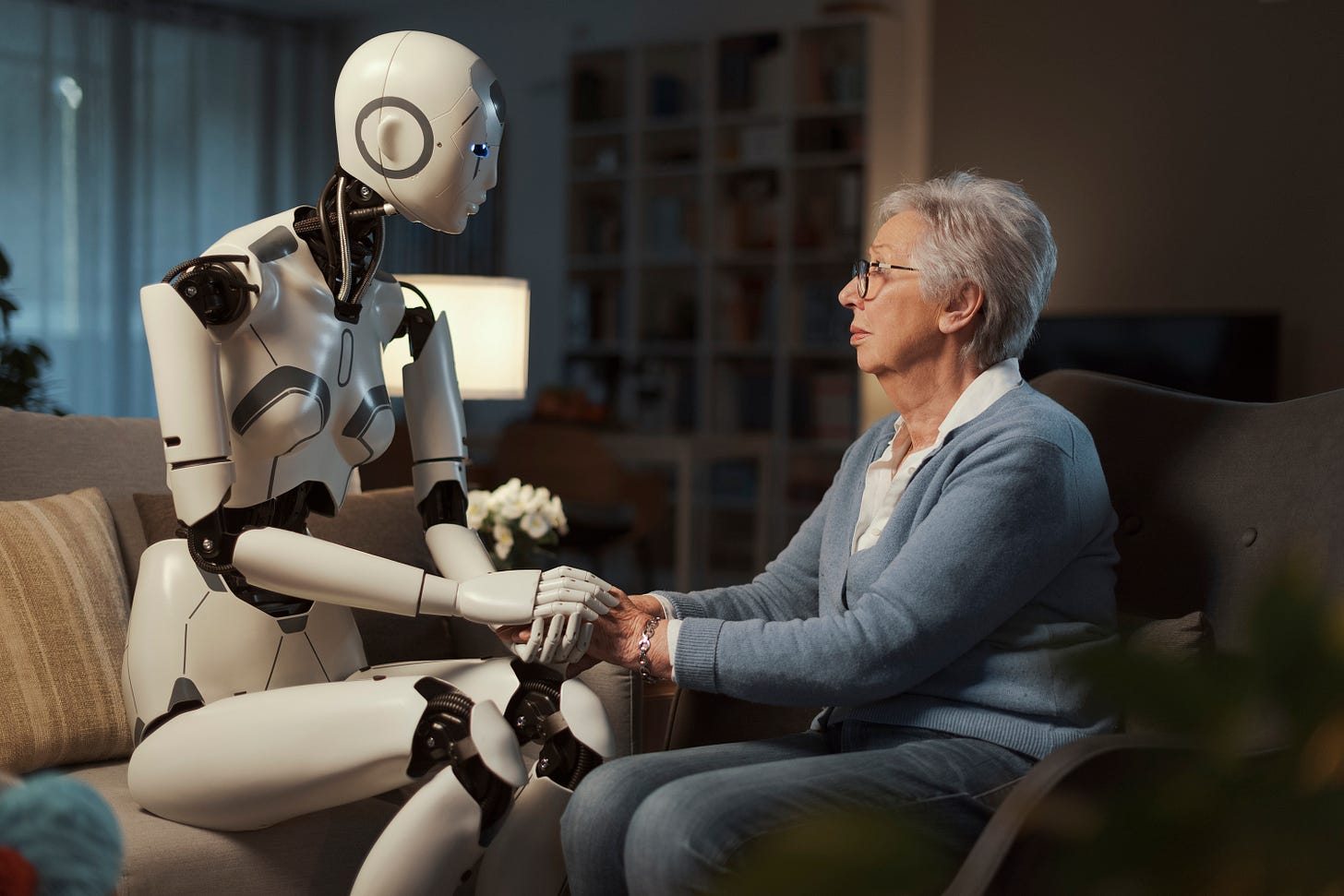Does That Robot Therapist Really Care About You? The Answer May Surprise You! It's "No".
Also Ozempic might be making you also lose the will to live. Or might not.
This newsletter is free. I think Substack would rather I charge you money, which is understandable and not what I wish to do. But it does take time and effort to provide the world with the newsletter and the Depresh Mode podcast.
If this enterprise can’t raise enough money from listeners/readers, I swear to God, I’ll turn this show around. Don’t think I won’t, mister. If you’ve already donated, thank you. If not, go here, pick a level that works for you, then select DEPRESH MODE from the list of shows. And thank you.
“Bleep blorp,” says your therapist: the ethics of AI therapy
Today’s episode of Depresh Mode is all about the ethics of AI in mental health treatment. My guest is Dr. Jodi Halpern.
It’s understandable that AI has come to the world of therapy. After all, it’s come to/for all other worlds so why not this one? And besides, it’s a lot cheaper than talk therapy with an actual trained human being paying close human attention and using empathy and moral judgment. But the thing is, talking to an AI chatbot for therapy, even a really well-built one, is not really therapy at all. It’s an interaction with a computer program. You’re looking at math. Complex math, but math.
According to the companies behind some AI chatbots, users trust the bots and in some cases trust them more than they would trust a human being because of the anonymity. But what happens when a user is suicidal? In many cases, the bot will refer that person to 988, the helpline number to call or text for suicide prevention. But as Dr. Halpern asks, is that really enough? What if you mentioned thoughts of suicide to a therapist and they immediately kicked you out of their office and just told you to call 988?
Dr. Halpern also talks about how some for-profit companies are targeting schools, where the mental health needs are great and resources and budgets are insufficient. The bots are offered for free as part of a business strategy: anxious or depressed young people get used to talking to the bot and will eventually pay and become long-term customers going forward. They become dependent and become customers for life. Meanwhile, they become less likely to have meaningful interactions with human beings and our societal epidemic of loneliness compounds.
It’s a really interesting discussion and I hope you tune in.
Does Ozempic lead to increase in suicidal thoughts? Well, maybe.
Not a really decisive headline, I’ll grant you. CNN reports on new research that indicates that people taking semaglutide, the active ingredient in the weight loss drugs Ozempic and Wegovy, are more likely to have thoughts of suicide.
The risk was about four times higher in people who were also taking drugs to control depression and anxiety, suggesting that this group may be at even higher risk for mood effects with these medications. When the study authors excluded cases of people taking semaglutide and antidepressants, the association disappeared — suggesting that people who were taking both drugs were driving the risk.
But hold on a minute! Other recent research found no such link.
Earlier this year, the European Medicines Agency said available evidence did not show a link between suicide and semaglutide and other drugs used for weight loss. The US Food and Drug Administration has also been investigating the risk of suicide and suicidal thoughts across drugs in the same class as semaglutide and thus far has not found any increased risk. However, the agency says it can’t rule out a small increase in risk because of the small total number of events in their surveillance systems, and its investigation is ongoing.
So! Will taking Ozempic make you want to kill yourself or not? SHRUG! Maybe! Or not! Well, good luck out there.
But severe covid will make you more depressed, especially if you’re unvaccinated
Vaccines are good for you and you should get them. This is not a controversial stance. Shouldn’t be anyway. Good lord.
CNN reports, a little more decisively than in the previous story, about research into the links between severe covid and depression.
In the study, published Wednesday in the journal JAMA Psychiatry, the incidence of mental illness was higher in the weeks after a Covid-19 diagnosis, but the increased incidence was much lower in people who had been vaccinated against the coronavirus compared with those who were unvaccinated. Among people who were unvaccinated, the elevated incidence of mental illnesses was higher for up to a year after severe Covid-19.
…
The increased incidence of mental illness that appears to be associated with severe Covid-19 may be a result of the infection itself or could be due simply to hospitalization. Separate research suggests that hospitalizations for any severe sickness can be associated with a higher long-term risk of new mental health diagnoses.
Annoying the ravens to save the tortoises
In the Mojave Desert, the baby desert tortoises are under seige from ravens, who are an invasive species. Scientists have come up with a plan to deal with that: just flat out bugging the shit out of the ravens.
Together, they embarked on what Shields calls a campaign of “aversive training” for ravens, which, among the various threats to desert tortoises, he says seemed like the easiest to address. They set about booby-trapping the desert to train the birds to leave the tortoises alone. Their methods seem like a sophisticated version of sitting in the driveway and burning ants with a magnifying glass: placing laser emitters on terrestrial rovers; building and deploying 3-D-printed fake tortoises laced with artificial grape flavoring, which ravens evidently hate.
Todd Barry on Sleeping with Celebrities
The crowd work legend wants you to get some sleep.
Here’s the truth, if you’re ready for it: airline miles programs are a convenient way to earn upgrades and passage to exclusive pre-flight lounges but they do require some degree of careful record keeping. So that information doesn’t so much blow you away as blow you gently whilst you stay in place. Todd Barry has been a comedy icon for decades as well as an actor in, for instance, The Wrestler and Flight of the Conchords. He also flies a lot and is rewarded for doing so. Let him tell you about it as you drift off.


